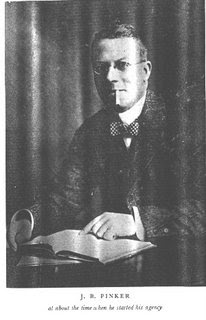Curious affair in the village yesterday. Owners of land bordering the forest have the right to catch such deer as they find on their land. Now is the season when deer stray, in search of young shoot. They stray about dawn. Villagers organise a sort of surprise for the deer. They arise before dawn and lie in wait. Yesterday morning sixty people caught six deer. The deer were killed in an open yard close to this house, and blood ran in gallons into and down the road. The sixty people drew lots for the best cuts, and one hears the monotonous calling of the numbers. One tenth of a deer for each person. This morning I saw 4 biches and 3 cerfs slowly cross the road in the forest, about 100 yards behind me.
Yesterday I finished the 5,000 word supplementary instalment for "Helen with the High Hand", begun on Saturday afternoon, and I posted it to Pinker this morning.
James Brand Pinker established himself as a literary agent in mid-January 1896. When he died twenty six years later, he was acknowledged as the greatest literary agent of his time. He was born in 1863 and came from a rather modest background. He left school early to work as a clerk at Tilbury Docks in east London. At the age of 27, in 1888, he began work as a correspondent for the Levant Herald, one of the English dailies in Constantinople, where he remained for three years. In mid-January 1896, recognising the need for a powerful business influence on the literary world, he established himself as a literary agent in Granville House on Arundel Street. It was a case of gamekeeper turned poacher. 1896 was a good year to start a literary agency. Literacy was spreading rapidly. In 1894, the art of fiction had been liberated from the albatross of the obligatory three volumes for a novel, thanks to a joint decision by Mudies and W.H. Smith's circulating libraries to only stock single volume novels. James Pinker established a clientele of great standing. He looked for relatively unknown authors whom he could wean and grow with, rather than attempting to prove himself with writers who were already successful. He set out to be imaginative about his role as agent. His entry into the Literary Year Book of 1901 stated his position: "Mr. Pinker has always made a special point of helping young authors in the early stages of their career, when they most need the aid of an advisor with a thorough knowledge of the literary world and the publishing trade".
William Tufnell Le Queux (1864 - 1927) was an Anglo-French journalist and writer. His best-known works are the anti-German invasion fantasies The Great War in England in 1897 (1894) and The Invasion of 1910 (1906), the latter of which was a phenomenal bestseller. Le Queux wrote 150 novels dealing with international intrigue, as well as books warning of Britain's vulnerability to European invasion before World War I
Very proud of my extraordinary industry and efficiency at the present moment. Over 100,000 good words written in the first quarter of this year.
I tried yesterday and today to comprehend a resume of the metaphysics of Prof. Bergson, in the current Mercure de France, and simply couldn't. Not the first time I have failed to interest myself in metaphysics. History and general philosophy much more in my line.
Henri-Louis Bergson (1859 – 1941) was a major French philosopher, influential especially in the first half of the 20th century. Bergson convinced many thinkers that immediate experience and intuition are more significant than rationalism and science for understanding reality. He was awarded the 1927 Nobel Prize in Literature "in recognition of his rich and vitalizing ideas and the brilliant skill with which they have been presented". In 1930, France awarded him its highest honour, the Grand-Croix de la Legion d'honneur.


No comments:
Post a Comment